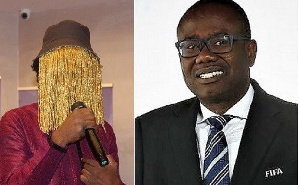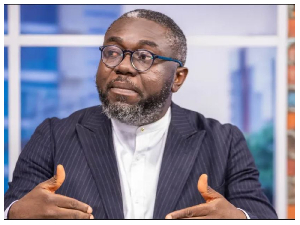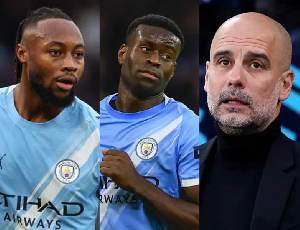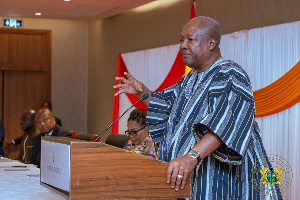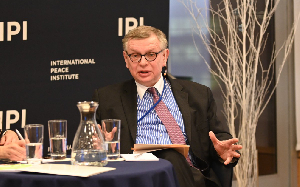I would like to wade into the controversial Ghana Football Association (GFA) brouhaha which has gripped the generality of Ghanaians lately. Like many Ghanaians, I have been absolutely flabbergasted by the explosive Anas exposé which has thrown the state of our football into turmoil.
As a silent watcher of the Ghanaian football scene, I have been aware of the rot that has eaten deep into the nation's most popular sport. I suspected, for instance, that the winners of our premier league at the end of each season may sometimes not be genuine champions. Moreover, the clubs often relegated at the end of the season may not necessarily be the weakest in the league.
Fixed matches and biased officiating have been rampant. Even the goal kings and best players declared at the end of the season may be corrupted. For instance, how can a player score a hat trick to enable him to win the goal king award, while his team loses the match to a team battling to avoid relegation? In other words, the player of Team A scores a hat trick against Team B to win the goal king award while Team B wins the match to avoid relegation.
In spite of these observations and suspicions, I was stunned by the extent of the rot as revealed by the Anas expose'. I was particularly shocked by the role of Mr Kwesi Nyantakyi, the former president of the GFA. Prior to becoming the president of the GFA, I knew Nyantakyi from our time at the VIP Annex of the Accra Sports Stadium, where we used to watch matches with other football lovers such as Nii Lantey Vandapuye, Oduro Nyarko of Okwahu United fame and many others while eating sweets provided by some of them. I was therefore surprised at the seeming bad blood between Nyantakyi and Nii Lantey Vandapuye when the latter was Minister for Sports.
I must confess, however, that I was thrilled beyond measure that Kwesi Nyantakyi, as a young man and a lawyer, was elected president of the GFA. When, under his administration, the Black Stars qualified for the soccer world cup three times in succession, I was positive that our football was in the right hands. In due course, he was elected head of the West Africa Football Union (WAFU), appointed Vice President of the Confederation of African Football (CAF) and elected into the Executive Council of the Federation of International Football Associations (FIFA), which I thought were all well-deserved. Indeed, I began to harbour hopes that, one day, he would become the president of CAF and ultimately, ascend to the top leadership of FIFA. One can, therefore, imagine my consternation at the revelations of the Anas expose'.
I am not too sure whether what the government is doing is the right step to take. By my training, I have learnt to be loyal to my nation and to accept, without question, decisions taken by authorities. Nevertheless, I have my own views on this issue, which may not necessarily amount to criticizing the national leadership. When President Akufo Addo directed the CID to pick up Nyantakyi for questioning, at a time when Ghanaians did not have the benefit of viewing the video, questions were asked whether the president would have done the same thing, if he and his vice were not mentioned in the video clip they watched. However, having seen the video for themselves, everyone now agrees that the issues go beyond the President of the Republic and those mentioned. As stated earlier, the rot is beyond belief. All the same, can we say, without fear of contradiction, that the intervention by government is the best approach?
Like everything in Ghana today, this issue has been given a political twist, so I will endeavour to avoid that pitfall. The general consensus shared by those who watched the video, and even those of us who only read about it, is that the GFA needs to be overhauled. I believe that informed the actions taken by the government on the issue.
First, we were told that the GFA had been dissolved. Later, we were told that it had not been dissolved but that government was taking steps to have it dissolved. The Police had already taken over the premises of the GFA. Finally, we were told that the AG was going to court to have the GFA dissolved. At the end of the day, we were informed that the court had placed an embargo on all activities of the GFA for ten days. As if that was not enough, we are now being told that a five-member Interim Management Committee (IMC), comprising Dr Kofi Amoah, Abedi Pele, Kudjoe Fianoo, Rev Osei Kofi and Ms Eva Okyere, had been set up to oversee the running of the GFA.
I believe that government is being cautious with its approach to this issue because FIFA frowns on the interference by national governments in the activities of football associations (FAs). Numerous examples abound where FIFA suspended national associations from participating in football-related activities due to what it viewed as government interference. By the way, the word interference means a lot of things to a lot of people. When does interference mean intervention and when is intervention actually interference? Does the action by the Ghana government amount to interference or intervention? Only time will tell.
My difficulty here is with the formation of the IMC notwithstanding the embargo placed on football-related activities for ten days. Note that the court did not dissolve the GFA; it only placed an injunction on its activities. So why set up an IMC in place of the GFA? What if, after ten days, the court decides that it is unlawful to dissolve the GFA. By the way, what are the terms of reference of the GFA? Is the IMC to restructure the GFA or to act as an interim GFA?
I am aware that, over the years, our football administrators have used the mantra of "no interference by government in FAs" to engage in acts that have culminated in the sordid situation we now find ourselves. However, FIFA must have had very good reasons for inserting that clause in its policies. Even with that clause in place, there have been numerous examples of governments trying to run football associations, either directly or by proxy.
That is why every minister of sports in Ghana, one way or the other, has had issues with the GFA. We thought that Nii Lantey Vandapuye, being a football person, was going to make a difference. However, after proclaiming that he was not going to be a minister of football, he ended up being just that, like those before him. In fact, he turned himself into chairman, secretary, treasurer, coach and team manager of the national football team, the Black Stars. His was not interference or intervention, but a take-over of the national team. I monitored his vituperations on the subject of the GFA after the airing of the Anas video, especially his claims that they intended arresting Nyantakyi in January 2017 and, like any well-meaning Ghanaian, I was not convinced.
Perhaps the history of football in Ghana has made government control over football matters seem normal. As Director of Sports, Ohene Djan was also the chairman of the GFA. Subsequently, all chairmen of the GFA were appointed by the government. In 2001, Ben Koufie was appointed the chairman of the FA with Abedi Pele as his deputy. They were succeeded by Nyaho Nyahoe Tamakloe. It was after Nyaho Tamakloe that Kwasi Nyantakyi was elected by the Executive Committee of the FA, which is made up of the various divisions of the football league, juvenile football, women's football and other stakeholders. The General Secretary position, which was also an appointed one by the government, was also advertised and filled by the GFA itself. With this, the GFA became answerable to the stakeholders who elected its president and not the government. However, it remained answerable to the government of the day in the running of the various national teams. That is why it is said that the GFA is semi-autonomous. Note that government does not pay the staff of the GFA, not even the General Secretary, who is a full-time employee.
So, in a way, the GFA is an association of football clubs and other stakeholders in the football fraternity in the country. That is why some people are raising questions of whether the government can dissolve the GFA. Others are asking why the government did not dissolve the Ghana Bar Association when Anas exposed some judges for acts of corruption. Moreover, if the GFA is not a government-controlled body, how can government dissolve it? Can government dissolve other associations like the National Union of Ghana Students (NUGS), Ghana National Association of Teachers (GNAT), University Teachers Association of Ghana (UTAG), Ghana Medical Association (GMA), Ghana Registered Nurses and Midwives Association? Think of all the various social groupings operating in the country. Can government step in to dissolve any of them, if their executives are found to be engaged in acts of corruption?
I must point out that running of club football in Ghana is a herculean task. It is a sacrificial job, to say the least. Many a football owner has become bankrupt and abandoned the game. Many football clubs which sprang up in the 1970s and 1980s have become extinct today, while some only exist by name. Where is Kumasi Cornerstones, Abuakwa Susubiribi, Savanna Stars? Even football clubs which were sponsored by companies have collapsed. Do you remember Akotex, Juantex, SS 74, GHAPOHA? The game has now become professional, meaning that it is the only means of subsistence for the players, coaches and other staff associated with the clubs. They are paid salaries like any other workers. They pay Social Security, income tax and they are insured. That explains why clubs sell players at the end of every season to survive. That also explains why club owners will do everything to get their players into the various national teams, which is a sure way to catch the eyes of scouts of foreign clubs in order to play professional football abroad. That explains why players who have been in the game for several years remain juvenile players until they play at the national under-17 or under-20 teams. There was this Under-17 player who completed senior high school three years earlier but was said to be only 14 years old. Amazing! The bribery of match officials, the collusion of clubs to cheat and other such malpractices have become characteristic of our game in Ghana because of the difficulty in running football clubs.
I am by no means trying to justify the rot that has eaten so deep into the game. Far from that. I am only trying to expatiate on the problems that have bedevilled the game in the country. Perhaps, it is symptomatic of the general decay in the nation. Corruption seems to be the norm in almost every area of our national economy. It used to be associated with some security agencies, but truth be told, it is even worse in some civilian establishments. What we are witnessing as a result of the Anas' expose' is not therefore unique to the GFA and football alone for that matter. If Anas' lenses could penetrate many more sectors in the country, we will discover that there is a general malaise afflicting the country. People term it third world blues, but I wonder whether the situation will be different even if our economy improves.
While we wait with bated breath for what happens after the ten days granted by the court, the jury is still out there as to whether the government's action is interference or intervention in football matters. By the way, if the court says all football activities should cease for ten days, how come the IMC is allowed to operate? Moreover, what criteria was used to select the people who constitute the IMC. Abedi Pele is undoubtedly the greatest player to have played the game in Ghana, if not Africa. Dr Amoah spearheaded Ghana's Organizing Committee when we hosted the 2008 Africa Cup of Nations. Rev Osei Kofi is arguably one of our best players who did not play abroad because professionalism was not in vogue in his day. Eva Okyere was a sports journalist even before she became a lawyer, if I am not mistaken. However, what do they bring collectively into the office? Perhaps the only active football administrators among the lot are Kudjoe Fianoo and Abedi Pele. Kudjoe Fianoo has the added advantage of being the Chairman of the Ghana League Clubs Association (GHALCA), which was reportedly rebuffed by the Minister for Sports when it wanted to initiate its own processes to address the issue.
By the way, are the appointing authorities aware that, if Ghana had been a serious football nation, Abedi Pele might well have been banned for life from the game? Remember on 28 March 2007, his team, Nania FC and Great Mariners engaged in the most disgraceful fixed matches in the history of this country. While Nania FC beat Okwahu United 31-0, Great Mariners also won 28-0 against Mighty Jets in the final matches of the national middle league. Their only punishment was a fine of $20,000.00 and demotion to Division 3, while the players were supposedly suspended for two seasons. I am using Abedi's case as an example because he is the most exposed of the lot, having played professional football in many foreign countries and should have been the last person to involve his club is this messy action.
Football the world over has in-built mechanisms for addressing any breach of their statutes. That explains why in the midst of the serious corruption allegations levelled against Josep Sep Blatter and his general secretary and other executives, FIFA was not dissolved but the individuals involved were dealt with. That is why Issa Hayatou, for many years the President of CAF, in spite of the many allegations against him, remained in office until he was booted out and little-known Ahmed voted in his place.
We were told that the GFA or what remains of it had referred the Anas expose' to its Ethics Committee headed by COP Kofi Boakye, who is not only a senior Police officer but also a lawyer, to investigate. I hear the Committee requested for a copy of the video so that all those implicated in it could be identified. If the Ethics Committee had acted on the content of the video and government was not convinced that the right thing had been done, it could have taken further measures. But practically taking over the running of football in the country looks like interference, in my opinion. By the way, what can the IMC do that the Ethics Committee cannot do? Or the same brush is now being used to paint everybody associated with the GFA? If that is the case, then Kudjoe Fianoo has no business on the IMC. Already, the clubs are complaining that they cannot pay their players' salaries because the league has been suspended. Is government going to bear the costs? The Black Princesses who are supposed to be in camp preparing for the Under-20 Women's World Cup have been sent home. Will the IMC take over their administration? The government's action appears to have been rather impulsive and not well thought through, though well-intentioned.
Admittedly, if the so-called inbuilt mechanisms of the GFA had been allowed to operate, the rapidity with which government wanted to see action taken on the issue would not have been achieved. For instance, if Kwesi Nyantakyi had not resigned, the only way to remove him would have been by impeachment by an extraordinary meeting of the Executive Committee of the GFA. Of course, knowing that the revelations in the video made his stay in office untenable, he decided to throw in the towel. With regard to the others seen in the video, the FA's own mechanisms could also have been used to deal with them. This does not preclude the prosecution of those found to have been involved in criminal activities. In the case of Kwesi Nyantakyi, some of us are waiting to find out how much he actually made from his shenanigans, apart from bringing the name of the president and other politicians into disrepute.
By all means, let us restructure our football. The gargantuan revelations stemming from Anas' video cannot be swept under the carpet. In actual fact, our football needs a complete revolution. But is government the right agency to bring about the revolution? Can the IMC comprising of a businessman, a football administrator, two retired footballers and a sports journalist and lawyer revolutionize Ghana soccer? In the meantime, what happens to the thousands whose very livelihood depends on football, with all football activities suspended? Government should act now if the situation is not to descend into total chaos.
Opinions of Friday, 22 June 2018
Columnist: Lieutenant Colonel John HK Buntuguh (Rtd)

